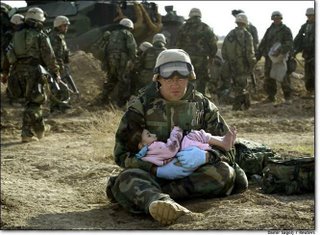
I've been reading Andrew Sullivan about ever since I seriously got into political blogging -- for about three years now, I guess -- and my opinion of him has changed numerous times during that period. Before the '04 election, his posting was about an equal 50-50 mix of genuine insight and boilerplate GOP-talking-point regurgitation; these days, as his eyes seem to have been fully opened to the true cravenness of the Bush administration's incompetence in everything from the Iraq war to the budgeting process at home, that mix has been dialed down to about 75-25 or so. Though more sensible now than he used to be, he'll still throw in a neocon-esque howler every once in a while -- but more so than ever, even when I disagree wholeheartedly with Sully, he still gives me something to think about.
This post of his from Friday is pretty much a microcosm of his current state -- at times infuriating, yes, but overall thought-provoking. In responding to an e-mail that proposes a potential Democratic strategy on the overall situation in the Middle East -- something that Sullivan has chided them incessantly for lacking, sometimes with good reason, sometimes in the service of mere pettiness -- Sullivan made me, by turns, hopeful . . .
The Iraq fiasco has shown the enormous difficulty of using blunt force to create an organic democratic change in a few years. But the future is not written yet -- and the Scowcroftian policies of propping up fast-failing dictatorships (a policy that gave us the first Islamist government in Iran) was clearly insufficient after 9/11. So call me a chastened neocon, if you must: appalled by the execution, humbled by the unintended consequences, but still unable to surrender the belief that more democracy and liberal institutions in the Middle East is the only long-term solution.
What does this mean in practice? Redeployment within Iraq to regions where we truly can encourage democracy and prosperity, like Kurdistan. More "soft" support for democratic movements in the Muslim world -- the kind of backing we gave Eastern European dissidents in the Cold War -- is essential, if done subtly enough not to prompt backlash. Encouraging the entrepreneurial Gulf states to grow in wealth and influence cannot hurt; a serious non-carbon energy policy at home is part of the mix as well. . . .
. . . and pissed-off:
If the Democrats could present a multi-faceted, hard-nosed approach to winning the war, a lot of us in the middle would give them a second look. But so far, not so good. I'm waiting for a leading Democratic nominee to pill a Sistah Souljah on the anti-war left, to call them on their irresponsibility and narcissism.
I don't get where Sullivan gets "narcissism" from; I'm a little more inclined to admit to his charge of "irresponsibility," though with the caveat that if being deemed "responsible" on national security requires assenting to every cockamamie invasion plan that comes down the neoconservative pike, I'll take "irresponsible," thank you very much. There seems to be a prevailing opinion amongst the self-proclaimed Those Who Know Better in Washington that "seriousness" on national security
requires one to get behind every single war the neocons propose, no matter how short-sighted or spectacularly ill-thought-out. You could see it in
the comments left at this thread (and, to a lesser extent,
this one), in which I got called a "pussy," amongst various other things, simply for thinking that a wholesale Israeli attack on Lebanon, or a massive U.S. invasion of Iran, might not actually be such a great idea. My conservative critics, from what I could see, gave no thought to whether the Israeli attack on Lebanon might not
actually be accomplishing anything, or to the potential consequences of an invasion of Iran; I was opposing a war, period, that's it, so that automatically makes me a lily-livered, tie-dye-wearing, terrorist-appeasing, Lieberman-purging pussy.
Those commenters may not realize it, Andrew Sullivan may only now be noticing it, but I think the American people -- if current polls are any indication -- have started coming around to it:
War is not the automatic solution to everything, not even the wide-ranging problem of what to do about the Middle East. More to the point, war isn't even the solution to the problem of how to inspire
democracy in the Middle East, because democracy at the point of a gun -- as we've seen in Iraq -- is, for the most part, really no democracy at all.
Furthermore, and I know I'm going to take a lot of crap for this, I just don't think it's the job of the United States to be the Great Democratizer and go around installing democracies in every country in the world that doesn't have one. Installing a new democracy is kind of like God giving Adam free will: It's great for people to have choice, but when you give them that, you have to account for the chance that they're going to choose something terrible. Look at Palestine and Iran: Those two countries are about as democratic as it gets in the Middle East -- certainly more so than the regime we just toppled in Iraq, or than so-called allies such as Saudi Arabia and Egypt, for that matter -- but in their most recent free elections, they chose, respectively, the Hamas party (basically a terrorist group) and Mahmoud Ahmadinejad (nuclear ambitions and rhetoric on Jews basically indistinguishable from Hitler's). Do we really want to spend thousands of American lives and billions of American dollars on giving nutjobs like these a chance to flourish? Democracy is a wonderful thing, and I'll champion it every chance I get, but it's also something to be considered very carefully, and I don't think it makes me or any other Democrat "irresponsible" or "narcissistic" to say so. Andrew Sullivan may think that not wanting to wave my magic democracy wand and immediately bestow democratic governments on every single country in the Muslim world means I lack "vision," but eventually he and other right-leaners are going to have to face the put up/shut up dilemma and decide exactly
how they want all this wonderful democracy to be executed. Until then, I'll take no more where-are-your-solutions crap from them, thanks.
Basically it seems to me that the overall, writ-large War on Terror, Middle East Situation, or whatever you want to call it boils down to three areas. There are the very focused, specific problems of countries where we're already hip-deep militarily, i.e. Afghanistan and Iraq; the somewhat larger issues of countries like Iran which we haven't directly engaged yet, but where a threat is definitely presented; and the still larger, civilization-affecting issues of how the Muslim world and the Western world relate to each other going forward. For lack of a better way to describe these, I'll use modifiers used by economists and physicians and call them Micro, Mini, and Macro -- and make no mistake, I'm using them to refer to their scope relative to one another, certainly not their severity or urgency. Sullivan wants a Democratic solution, here's my best stab at it:
 The Micro-Problem(s): Iraq and Afghanistan.
The Micro-Problem(s): Iraq and Afghanistan. These are the two countries where we've gotten directly involved in a military sense to try to start up some kind of sustainable democracy. In one of them the situation,
as I've said, has degenerated into near-hopelessness; in the other, we've still got the chance to accomplish something. First of all, I want to confess that that linked post, about "losing hope" in Iraq, was written in a very emotional moment and probably overstated the case more than it should have, and to that extent I apologize. I don't
want to yank every last American soldier out of Iraq and leave the country to rot for all eternity, but my main point is that things are never going to improve there unless the Bush administration concedes that things are in dire straits there and commits to solving that problem -- which, given their track record, will probably happen about the Twelfth of Never. I don't know that I can offer anything truly helpful on Iraq, but I'm open to the idea of redeploying troops into Kurdistan and focusing their reconstruction and democratization efforts in a region where they might actually do some good. I hate to even utter this out loud, and I don't even know whether I fully believe it, but it's possible that a Shiite-Sunni civil war is simply something the rest of Iraq simply has to get out of its system before a more wide-ranging democratization effort can be undertaken. By no definition is that a
good thing, but we may have so badly bungled the Iraq war by now that we just have to accept it. We may have to simply do what we can in the Kurdish areas and keep a contingent of troops around just to keep a civil war in the rest of Iraq from spilling over into a wider area.
Meanwhile, there
is a country where all hope is not lost, and that's Afghanistan. But we're going to have to start paying a lot more attention to this forgotten war if we want that to happen. Part of what made me so furious about the Iraq war is that we basically used it as an excuse to treat Afghanistan as the forgotten red-headed stepchild of our foreign policy, and sure enough, nearly five years after the initial invasion Afghanistan is a place where the citizens still aren't truly safe, the infrastructure is decrepit, and the Taliban has been doing its level best to bounce back. If we really want to see stable, prosperous democracies emerge in the Middle East, Afghanistan has to be one of them, and that means upping U.S. troop levels there to squash the Taliban resurgence and speed up the rebuilding of the country. We're also going to have to be prepared to spend a lot more money on that country to make sure that the people actually have electricity and running water, and it might be nice to expend some effort on clearing it of its debilitating concentration of land mines.
Right now Afghanistan is still our best hope for creating what the Bush administration claims to want -- i.e. a reborn democracy that will serve as a model example to the rest of the Muslim world. But it's not going to happen unless we start investing more sweat and dollars into it. If the last three years are any indication, the Bush administration doesn't seem to be interested in this; the Democrats are going to have to be the influence that forces him to start
taking an interest again.
 The Mini-Problem(s): Israel vs. Hezbollah, and Iran vs. Everybody.
The Mini-Problem(s): Israel vs. Hezbollah, and Iran vs. Everybody. These are the conflicts in which the U.S. has not gotten directly, militarily involved but could still have wide-ranging effects on the entire Middle East; for that reason, they may not have the immediacy (at least for us) that Iraq and Afghanistan do, but we're still going to have to formulate some kind of strategy. In the short term, there has to be a cease-fire in Lebanon -- which both
the Israeli people and the Lebanese people seem to want -- and after that, the United States needs to take the lead in strengthening the Lebanese government and military so that they can root out the Hezbollah element and become independent of them in the same way that they declared independence from Syrian influence a year and a half ago. As
I've said before, the Lebanese people's repudiation of Syrian control instantly made them another golden opportunity for the kind of model democratization we've been praying for in Iraq and Afghanistan, but that'll never come to anything if Israel manages to reduce the entire country to rubble in its justified, but not terribly well-thought-out, hunt for Hezbollah. In many ways, the Lebanon situation is analogous to that of Afghanistan: You've got a country where instability has allowed the rise of a movement (the Taliban/Hezbollah) that has provided
some benefits to the people (law and order, for instance) but overall has been a hugely detrimental presence and one that the country's people would just as soon be rid of. Rather than an adversary, Lebanon is a golden opportunity to make another ally. Unfortunately, they're still not strong enough on their own to get rid of Hezbollah themselves, so the U.S. and Israel are going to have to join together to help rebuild the country, provide advice and resources to guide the government to self-sufficiency, and grow the Lebanese military into a force capable of defending the country on its own. These measures alone won't destroy Hezbollah, of course, but if Hezbollah can be marginalized within the Lebanese borders, it'll still make it that much harder for them to threaten Israel.
As for Iran . . . well, I'm still not sure what to do about them. If we're already hip-deep in Iraq and Afghanistan, trying to mount a
third simultaneous military operation is out of the question, at least for now. This won't make the kill-'em-all-let-God-sort-'em-out
Gen. Jack D. Rippers in the radical-neocon camp happy, but I think at this point all we can feasibly do is continue negotiation efforts, continue to monitor Iran's activities through
IAEA inspections, and in the meantime do what we can to support the liberalization movement that was actually making some pretty inspiring progress until Bush decided to throw the Iranian people under the bus with the rest of the "Axis of Evil" back in 2002. I won't even go so far as to say that military can
never be an option regarding Iran, but only a fool would think it's something we can undertake with operations already going on in Iraq and Afghanistan, and given my natural caution about war-starting in the wake of the Iraq fiasco, I don't think I could conscion a full-scale invasion until the threat becomes at least
somewhat more imminent than it is now. If that makes me an anti-war, Chamberlain-loving "pussy," so be it . . . but howsabout you tell me how
you plan on invading Iraq without starting World War III (or IV, or whichever one we're on at this point).
 The Macro-Problem: Islam, the West, and how we all can just get along.
The Macro-Problem: Islam, the West, and how we all can just get along. Obviously, this is an even thornier and more complicated issue than either of the other two, and the whole thing pretty much revolves around the issue of Israel v. Palestine. All parties involved seem to have recognized the inevitability of a Palestinian state, which is a start, but I think that Israel is going to have to allow eastern Jerusalem to be the Palestinian capital if there's ever going to be any kind of peaceful coexistence betwen Israel and Palestine. They can build a massive Berlin Wall-type structure down the dividing line and fortify it with a hundred thousand IDF troops if they have to, but that's what's going to need to happen. And before anyone jumps on me about wanting Israel to "give up" even more territory than it already has, keep in mind that even the United States doesn't recognize West Jerusalem as the Israeli capital. There may also have to be some kind of black-and-white reckoning between Israel and Palestine on the questions of Israeli settlements and Palestinian refugees' right of return, which, to my mind at least, seem linked: If Israelis still have free reign to settle in the occupied (or even once-occupied) territories, is it really fair to bar Palestinian refugees from reclaiming land they once owned that is now part of Israel? Or, to turn the question back on the Muslims, how can you demand a Palestinian-only Palestine if you won't allow an Israeli-only Israel?
Granted, that kind of simple logic rarely factors into a conflict that's gotten as violent and emotional as this one, but the U.S. is still going to have to be willing to mediate those kinds of disputes, and they're going to have to be willing to do so from a position that is as objective as possible. I know this is going to get me branded as anti-Israel, a terrorist-lover, or
worse, but the United States has to stop approaching every aspect of the Israel-Palestine conflict with the attitude that the Palestinians are wrong and Israel is 100% right. I can't help but think it's that kind of de facto bias that drives otherwise rational Palestinians into the arms of radicals like Hamas (and if you're going to leave some nasty comment on here about how there's no such thing as a rational Palestinian, go away and leave your comment at Little Green Footballs or something; this is clearly not the blog for you).
That brings me to a larger point, which is that America as a whole is going to have to get over the idea that the entire Muslim world is a crazed, bloodthirsty society cravenly seeking the destruction of non-Muslim innocents wherever they reside. Yes, there are a lot of Muslims who
do seek that, but to believe that
every single Muslim in the world feels that way is to resign our society to a global, inescapable holy war against the entire Muslim world. I know there are some radical nut jobs in this country who are spoiling for that; I'm not one of them. I believe some kind of peaceful coexistence
can be struck between the West and Islam, and
has to be, or else we've basically consigned ourselves to a new Crusade that will, unless anyone has a better idea, rage for all eternity.
Andrew Sullivan is, to some extent, correct when he says that the Muslim world as a whole has not done a good enough job of shouting down the freak shows like al-Qaeda who think that the wanton slaughter of innocents is a legitimate tactic, but that doesn't mean
all Muslims feel that way. Has anyone noticed, for instance, that the tip that helped expose the recent airliner-bombing plot in the UK
came from Britain's own Muslim community? Clearly, there are Muslims in the world who are just as repulsed by al-Qaeda's tactics as we are, and there's no point in antagonizing those people or acting like we see them as terrorists themselves. Instead, they need to be cultivated and given the opportunity to become full partners in our society, and thus full partners in the effort to rid the world of terror.
On a similar note, whenever we mount any kind of operation -- military, humanitarian, or a little of both -- in the Mideast, we need to have a very clear idea which parts of the operation are terrorist-killing and which parts are democracy-building, because those two tasks use a pretty divergent set of tactics. I know
I've harped on this at length, but I'm going to keep harping on it until it sinks in: The strength and coherence of our operation in Iraq has been consistently hurt by our inability to decide whether we're there to bring democracy to the poor benighted Iraqis, or whether we're just there to kill as many of them as possible. These sorts of dilemmas should sort of clue you in as to why democracy can't be bestowed at the point of a gun, but be that as it may, if we're going to declare as a country that bringing democracy to Muslims is a worthwhile effort, then we're going to have to concede that maybe, just maybe, we shouldn't go around jonesing for the fiery death of every Muslim we see. George W. Bush, for all his carelessness, truly seems to understand this; I only wish the same could be said for some of his acolytes -- and I'm not just talking about psychopaths like Ann Coulter, I'm talking about people in our own Congress.
Then, of course, there are the other things we need to do to separate ourselves from the old way of thinking vis-a-vis the Middle East, number one among them being an honest effort to end our dependence on foreign oil (actually, ending our dependence on oil
period wouldn't be such a bad thing to shoot for, either). This is going to require a gigantic level of sacrifice on the part of the American people -- a level of sacrifice that both the ruling Republican party
and most of the Democrats in Washington have been either too lazy or too chicken to ask for -- but it's not like America has been asked to sacrifice much of anything else over the past few years. Hell, we've invaded two entire countries and appear to be giving serious thought to invading a third, and not only are we not forcing Paris Hilton to give any of her tax cuts back, we're trying to figure out how we can give her
more.And on a completely separate track, we need to get real and start spending some serious time and money making our own country more secure, from our airports to our seaports to our borders. The whole "We're fighting them over there so we don't have to fight them over here" has been a real cute, glib way for our present administration to convince the public that the Iraq war is still worthwhile, but eventually we're going to have to wise up and consign that line to the ash heap of history along with "no new taxes" and "I did not have sex with that woman," because as long as we have to take off our shoes or dump all our liquid cosmetics before we get on a freaking flight to Cleveland, we
are fighting them over here in our own way. And we're going to have to start doing a much better job of it, too, because there's still very little keeping a particularly ambitious al-Qaeda operative from smuggling a backpack nuke into Baltimore aboard one of those container ships we're still not willing to spend the money to inspect.

So anyway, that's my plan, or at least my first attempt at one. It's certainly not perfect, it's not yet as fleshed out as I'd like it to be, and it's damned sure going to be expensive -- but if you can figure out how to win wars and protect our country without dropping some pretty major money, I'd sure like to find out how. Actually, that reminds me of another thing we as a country need to do -- while we're throwing stuff on the ash heap of history, we need to toss Donald Rumsfeld's "revolution in military affairs" on there with them, specifically the part that insists we can fight wars leaner and meaner with fewer actual soldiers. Again, if we want to not just toss out "evil" regimes but also rebuild their countries afterward, then we're going to need a whole lot of manpower to do that, and I hope the Iraq war has taught us that no matter how powerful the U.S. military appears to be, there's no such thing as a quick-'n'-easy invasion.
This is something I'm going to continue to think about and refine over the next few weeks and months, so don't think it's a final draft of anything. But whatever I come up with later on, two main ideas are going to remain constant: One, we need to be realistic about the fact that the entire Muslim world can't be rebuilt and reformed all at once, and two, war, no matter how necessary it may look, isn't
automatically the answer to a given problem.
At any rate, I hope this will keep people like Andrew Sullivan from thinking that
all lefties are being "irresponsible" and "narcissistic" about the issues at hand. Incidentally, had Sully bothered to look beyond his own apparently ingrained (and robustly mainstream-media-reinforced) preconceptions about Democrats being unserious about security, he might have noticed that the Dems
are trying to come up with just such a plan. As Kevin Drum notes in the link, there's a whole lot about their "Real Security" plan that's amateurish and facile, but at the very least it gives the lie to the idea that the Democrats are simply trying to ignore the global security issue at all costs -- and it's certainly more of an actual, coherent plan than anything the Republicans have come up with, which seems to be nothing more than the three meaningless words "stay the course."
So. These are my ideas. What are yours?




































